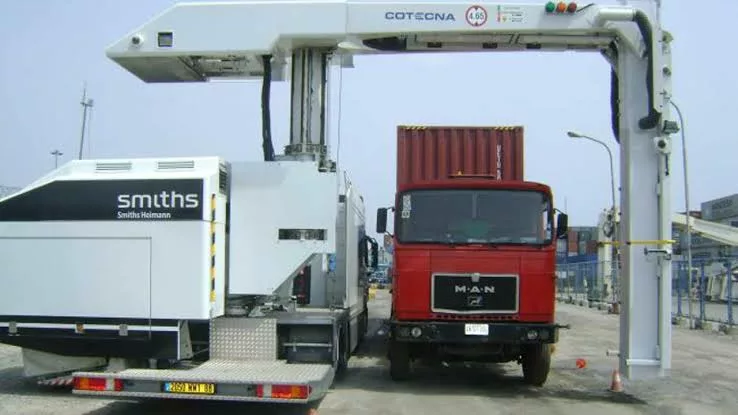After widespread condemnation and criticism of continuing 100 per cent cargo examination despite acquisition of cargo scanners, the federal government has finally commissioned the N8billion non-intrusive inspection (NII) equipment, also known as cargo scanners, at the Apapa Port complex.
The scanners which have been abandoned at the nation’s seaports for over one year were commissioned yesterday by the minister of Finance, Budget and National Planning, Mrs. Zainab Ahmed, amid skepticism by maritime operators who feared sabotaged by officers of the Nigeria Customs Service (NCS).
Speaking at the commissioning of the three new Scanners, Ahmed, commended the Federal Executive Council (FEC), for granting approval for the procurement and Installation of the Scanners and also the training of 120 officers of the service.
She, however, said the project would no doubt aid the NCS in the delivery of its mandates, in line with the key priorities of President Muhammadu Buhari-led Administration targeted at reducing poverty and stimulating favourable macroeconomic conditions for sustained growth and development.
According to her, the scanner has the capacity to detect prohibited import concealed in cargoes, adding that it enables more cargoes to be scanned and bring about the desired efficiency and effectiveness in cargo examination processes.
“The commissioning of these three non-intrusive scanners is in line with efforts to expedite Customs operations and achieve its mandate of ease of doing business, trade facilitation and preventing port congestion.”
“These three scanners will help increase revenue for government and improve national security. It will also help enhance the remote audit trail of goods within the port system,” she said.
She implored the Nigerian Ports Authority (NPA), port terminal operators and all stakeholders in the port to cooperate with NCS to take full advantage of the scanners, saying the equipment have the capacity to process up to 500 containers in a day.
“The commissioning of the three new scanners today, is a milestone in the Service efforts to expedite Customs operations, achieve ease of doing business, facilitate trade, prevent Port congestion, increase revenue generation to government and improve national security.
“I therefore implore the management of the NCS to collaborate with the scanners contractor, to ensure proper maintenance and full utilisation of the scanners within the 30 months provided in the contract agreement, as well as enhanced capacity building and training 120 Customs scanning officers,” she added.
She said that efforts are being made to procure more scanners for the seaports, land borders and airports in the country, saying the essence was to improve efficiency and generate more revenue to the government.
Speaking earlier, the Comptroller General Customs, Col. Hameed Ali (Rtd), said the scanners commissioned were intervention pending the commencement of the Customs modernisation that will deploy 135 scanners.
Ali, who stated that by 2023, there would be scanners all over Nigeria, said that were part of the reform strategy of the present administration.
According to him, the service was compelled to adopt technology as the linchpin for trade facilitation, adding that by recognising its strategic importance, the Service have chosen to embrace it in its entirety.
“Our modernisation project seeks to automate all our processes and procedures, of which the inspection of imports and exports is fundamental. We know that to remain competitive our ports have to be more effective and efficient.
“As trade increases in volume, so must our capacity for facilitation. Efficient cargo management and the full automation of Customs and other regulatory processes is guaranteed to bring down the cost of clearing, and ultimately the prices of goods in the open market, an occurrence that will be beneficial to consumers in Nigeria.
“We also understand that technology should be deployed in a manner most suitable to our needs and environment. This is why we have developed a standard operating procedure (SOP) for the use of these scanners. Our SOPs provide all stakeholders with a working guide as to their individual responsibilities,” he explained.
However, he said Customs officers, clearing agents, shipping companies and terminal operators, roles have been defined to show who should be doing what, where, how and when.
To him, spelling out these roles and how they should be performed would ensure the Service getting maximum benefits from using the non intrusive examination equipment.
“As the lead agency in trade facilitation, we are constantly in the business of reinventing ourselves. Not satisfied with the achievements of the past, our focus is on making the present great and the future greater. However, because we acknowledge the importance of partnering with other relevant government regulatory agencies, we have created windows that will enable connectivity to our systems.
“Where physical joint examinations were previously conducted by all relevant agencies, the scanning process will not only reduce the stress associated with positioning, off loading and taking inventory of containers. It will store recorded images in a safe format easily accessible by all agencies from the comfort of their offices. It makes the auditing of transactions using these images easier and will definitely checkmate attempts by non compliant traders to cheat the system.
“The challenge of security is of immense concern to all well meaning citizens. Since we know that a good number of items which pose a threat to national security find their way through our various entry points, we believe that the equipment that is being commissioned today will greatly enhance our capacity to defend our dear nation,” he said.











